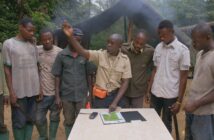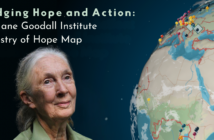I am a UN Messenger of Peace and it is not easy to think what message I should share this year. Because right now the world is so very far from being peaceful. Yet so many millions of people hate war and dream of living in peace. Mothers protest when their husbands or sons are forced to fight. And weep when they return wounded or in body bags. And the young men who survive are often deeply traumatized by the horrors of war. And there seems to be war or armed conflict all over the place. The Russia/Ukraine war, the continuing conflict between Israel and Palestine, the wars and conflicts in many African countries, the acts of terrorism by religious extremist groups, the oppression of indigenous people and minority groups, the school shootings, the increasing violence on the streets, and of course, racism and discrimination. And then there is our continuing attacks on the natural world – the deforestation, pollution, mining, and industrial agriculture with its use of often poisonous chemical pesticides, herbicides and artificial fertilizers. The very soil is being killed and there is a terrible effect on biodiversity. We are in the midst of the 6th great extinction of plant and animal species, this one caused by human acts of violence against nature, made worse by human induced climate change. We are treating billions of sentient animals with great cruelty as pets, in entertainment, in medical research laboratories and in our so-called factory farms. Just imagine what the world would be like if everyone paid heed to the Golden Rule common to every single major religions “Do to others as you would like them to do to you” and those “others” should include animals and mother nature.
This year the UN set the theme: Actions for Peace: a call to action that recognizes our individual and collective responsibility to foster peace. This call to action helps us to work on manageable projects that will collectively make a difference. And this is the mission of JGI’s humanitarian and environmental program, Roots & Shoots, now active in almost 70 countries around the world. Members will be flying giant peace doves, made of recycled bed sheets and chicken wire or papier mache, in many countries around the globe, while playing the song by Dana Lyons – Circle the World. They will also be choosing projects to promote peace with the natural world – projects such as clearing trash from rivers. lakes and oceans, planting trees, or raising money for conservation organizations. Some are working with those seeking to end the illegal wildlife trade. Some are volunteering in shelters for abandoned dogs and cats, or sanctuaries for rescued animals from factory farms or wildlife trafficking, walking dogs for the sick or elderly, tending their organic gardens, gathering together in their neighbourhood to share projects and stories, with food and drink from different cultures – having fun. And in this way they are learning that more important than the colour of skin, language, culture and religion is the fact that we are all human – we all feel mental and physical pain, we all weep, and laugh, ……and love.
We can, each and every one of us, do our best to show kindness to and respect for the people, animals and nature around us. Try to reconcile differences within our families or with friends or work colleagues. We can reach out a hand in friendship to a newly arrived refugee. We can make ethical choices in what we buy, what we eat, what we wear – which means we can refuse to buy products that have harmed the environment, been cruel to animals, are cheap because of unfair wages. We can support the many wonderful organizations working to free the world from nuclear weapons, find ways to help the leaders of warring factions to try and find peaceful solutions to their differences.
I am trying to bring together young people from Israel and Palestine to work together on projects to make the world a better place for people, animals and the environment. I was just in Tanzania, and everywhere Roots & Shoots members, Muslim and Christian, are working together on projects of their choice.
I want to end by describing a R&S project that seems somehow symbolic.
It’s about the first group of Roots & Shoots that was formed in DRC, the Democratic Republic of Congo. They decided for their project they wanted to put the forest back on what was once a sacred hill. It was actually not really possible, but their mentor, not wanting to discourage them, found some saplings that a friend of his donated. But he also had to go to the head of the group that was there, because this is in the area of conflict in Eastern DRC where all the minerals are. So there’s always warring factors, factions there. The head guy said; “Well, it’s a silly project, “but I suppose there’s no harm in it, “but I’m afraid I’ll have to send soldiers.” Well, imagine here’s this little group of about 15 young people, aged about, I don’t know, 10 to 12, each carrying their little sapling and something to dig with. And it’s very hot and it’s much further than they thought. And when they get there, the ground is very hard. With them are four big Congolese soldiers with AK-47s slung across their shoulders. And they stand there and watch the children. And after a little while the youngest, a little girl, starts to cry because the ground is so hard and she can’t dig the hole for her tree. And after watching this for about 10 minutes, maybe less, one of the soldiers lays his gun against a tree and goes to help her. And within the next 10 minutes, all the soldiers have laid aside their guns and are working with the children to help restore nature. That’s how the world should be.
To learn more information about our program or opportunities for basecamp involvement near you, please contact us at rootsandshoots@janegoodall.org.






